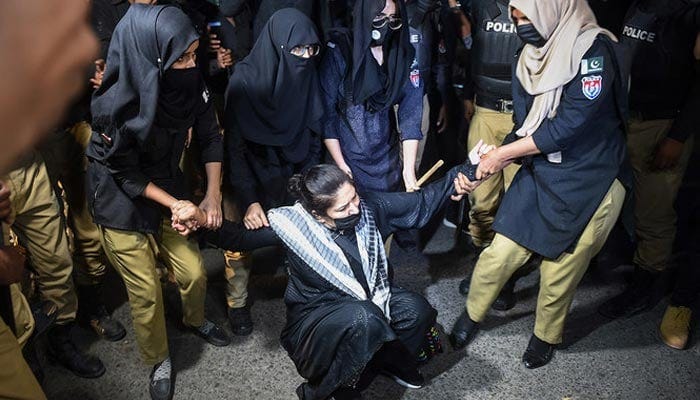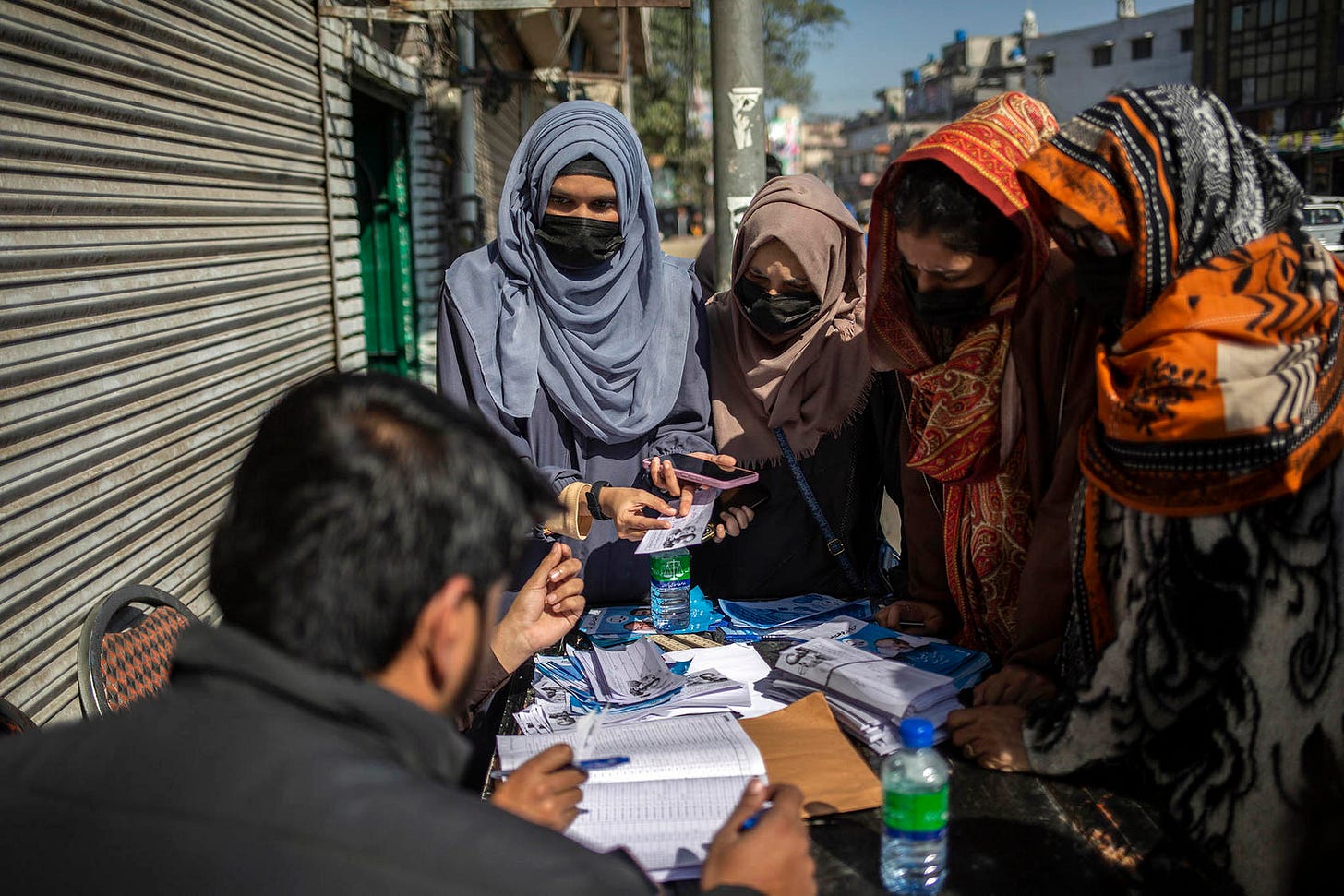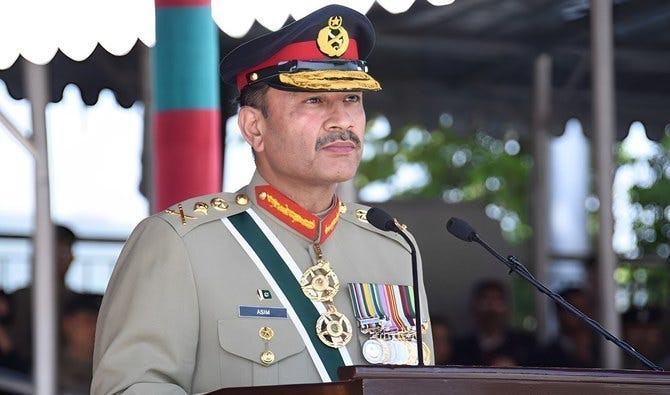How Pakistan Army generals lost an election to 20-year olds?
The military might have rigged an election to stop a popular party from coming to power but they are bound to lose to the country's overwhelmingly young population.
Yes, that sounds about right.
The 2024 Pakistan election results have changed the political landscape in the country. In many ways, things were the same as the historical scripts: pre-poll rigging, mobile networks shut down, and massive poll day rigging. In several other ways, the country has changed drastically: a massive digital campaign, a defiant electorate, and a surprising victory for a party leader currently in jail that has upset traditional power plays in the country of 240 million.
Pakistani politics have a few recurring features: independent candidates referred to as “electables” who rely on “biradari” networks to come into power and then join the party currently in favor of the military (aka the establishment) to form a government. (Imran Khan himself used this method to come into power in 2018, having earlier promised to not resort to the old style of politics.) The large number of electables in parliamentary blocs leaves parties open to defection and prevents them from pushing for the kind of meaningful reforms Pakistan desperately needs. When a politician falls out of favor, court cases abound, swift judgments are handed out and properties forfeited. Deals are struck behind closed doors and leaders either go to jail or go into exile, only to return when conditions are more favorable for their return. This forces Pakistani voters to elect candidates who might solve their problems regardless of which party is in power. These strained electoral conditions force parties to rely on close family members for loyalty, concentrating political power in the hands of a few dynasties and preventing alternatives from emerging.

Pakistanis saw unprecedented repression in the two years leading up to the election.
After violent protests following the Khan’s arrest, the military cracked down on the party. Several legislators were forced to join other parties or ousted from public life; others had to go into hiding. Prominent journalists were forced to leave the country. When outspoken news anchor Arshad Sharif was shot dead in Kenya, national outrage forced intelligence leaders to make a rare public appearance and explain that they were not involved in the killing. Another journalist, Imran Riaz was abducted and returned after four months of public pressure.
Pakistanis saw their law enforcement agencies brutally violate “chadar aur char diwari” (veil and four walls), a social custom where women, children, and the elderly not directly involved in a conflict are spared aggression. Police and intelligence agencies broke into houses without warrants, damaged private property, and traumatized family members. Authorities filed frivolous cases against political workers and detained them indefinitely. This is not the first time ‘out-of-favor’ political parties are facing repression but it is the first time it is happening when every one out of two Pakistanis has a smartphone. People saw these videos in disgust and found themselves forced to stay quiet.

This period of repression was followed by pre-poll rigging to prevent the PTI from coming back to power. Campaigning season also saw massive repression. Nomination papers were rejected, candidates picked up and their families intimidated. In a country as diverse as Pakistan, election campaigns involve a colorful display of rallies, canvassing, and expressions of dedication for political leaders. However, the extensive scale of the pre-poll rigging meant that campaigning was toned down. Nearer to election day, PTI lost its election symbol, the cricket bat, which is important for voters to identify a candidate in a country with 40% illiteracy. This forced the party to pitch its candidates as independents. The general sentiment of the country was that this election was heavily set in favor of the three-time former prime Minister Nawaz Sharif, who immediately returned from exile and did not campaign vigorously.
The PTI, however, showed remarkable resilience in the face of this repression.
There is a common understanding in Pakistani politics that a party does not become a major political force in the country until it survives the military's repression and PTI managed to earn its credentials this time. When the PTI cadre was forcibly dismantled, Imran Khan promoted junior leadership more loyal, more willing to stand up to repression, and more keen to keep the struggle alive. New leaders with national profiles have emerged and traditional ‘electables’ replaced by a mixture ranging from local grassroots activists to Oxbridge-educated technocrats to reformed dynasts seeking to join the tide of popular support.
On the ground, PTI also seems to have effectively built a highly decentralized, grassroots political structure adept at constituency-level organization, despite not being allowed to host rallies and campaigns. When their widely recognized election symbol was taken away, the electorate showed determination to learn which candidates were backed by PTI. We saw WhatsApp forwardable videos of candidate symbols, stories of young men explaining to their villages which candidate to vote for, and how to fold a ballot paper so their vote is not wasted. When cellular data networks were shut down, others filled in voter information using home and work wifi. TikTok is awash with videos of people warning candidates to not defect once elected and Instagram with reels of young people proudly voting on election day. This level of effective organization and mass mobilization is highly unprecedented in Pakistan.
Facing a national media ban, PTI used the latest technology to reach voters: chatbots sharing candidate-specific campaign information, AI-generated voice messages, ghost-written articles, and virtual rallies joined by 4.5 million people. The authorities were left aghast as they clamped down by shutting the internet and blocking social media platforms. Catchy songs urged people to vote to seek revenge through the power of the ballot; others glamorized mothers campaigning against traditional heavyweights. PTI’s social media teams, some of which are based out of the country, are on a constant content-churning stream that controls the news cycle and keeps audiences informed, much to the chagrin of their opponents who struggle to properly crop videos. PTI’s election campaign would most likely serve as a case study for upcoming elections in other countries.

On 8th February 2024, the Pakistani nation quietly delivered a silent revolution.
PTI-backed independents emerged as the largest bloc of candidates elected to Parliament.
The results shocked the establishment and placed it on the back foot. Pakistan Army then took a page from its old playbook and resorted to rigging. Results transmission was first delayed, then stopped, and eventually, losing candidates were declared winners overnight. Election rigging is not a new story in Pakistan, but its brazen scale this time around shocked the nation. Historically, most rigging occurred with votes getting rejected within a small margin to make favorable candidates win. In a parliamentary democracy, adding one seat to a party’s counter reduces one from that of another party; the difference is further increased when women and reserved seats are awarded in proportion to general seats. These changes can compound differences in seat counts and kill the largest party’s majority. However, the sheer voter turnout made changing results extremely challenging and the rigging has left a trail of evidence behind.

In line with the resilience exhibited by PTI, the party made a case of electoral malpractice directly with the public, launching websites and chatbots to show vote count discrepancies in disputed constituencies. When authorities blocked these sites, they were swiftly moved to GitHub, which is harder to block. In a country where mainstream politicians are used to taking a beating from the establishment without complaining, PTI successfully outplayed both the military and its opponents and has made a convincing case for itself to audiences both at home and abroad.
The establishment is facing a tough opponent in a party that represents the country’s vibrant, dynamic population.
This is a new dawn for a rapidly changing Pakistan.
The Overton window for what Pakistanis expect from their democracy has shifted. Its younger electorate has shown a willingness to change the rules of the game and refuse to have their fate decided by those wielding unelected power. Every one out of two people in Pakistan is under 30 years old: one of the world’s youngest populations and an incredibly young electorate. These voters rely on TikTok and Instagram to seek information free from the deep state’s influence. They contextualize today’s events by looking back at events like the 1971 civil war triggered when a popular party was denied its mandate and the 1977 military takeover during the chaos following a disputed election.

In today’s Pakistan, Sheikh Mujibur Rahman, who had been heavily propagandized as a traitor for splitting the country is now openly cited as a hero for standing up for civilian supremacy and political rights. This level of change in national discourse would have been unimaginable only a few years ago.

The 2024 election has also seemed to have allowed people to speak over the military’s chokehold on the economy. Pakistan Army consumes much of the poor country’s resources and considers itself a sacred cow free from civilian overview. It runs its massive tax-free conglomerates producing everything from fertilizers to baby cereals, crowding out private players from the market. Its networks of schools, hospitals, and pension plans provide a welfare state for retired soldiers leaving most Pakistanis to fend for themselves. The Army seeks cheap land to build housing associations, corporate farmland, and even wedding venues and cinemas. Civilian governments are then left at the mercy of international aid organizations and friendly countries to meet their fiscal needs. Amidst this gripping economic control and infantilization of civilian institutions, the military cites political instability - often generated by them - to justify a continued role in politics.
However, discourse in the country has now shifted and this election is a testament to it.
Where much of the anti-corruption criticism was focused on civilian politicians, new investigations have shown the extent of corruption conducted by high-ranking officers. (Here too). The Army has responded by passing draconian laws designed to stifle dissent. To avoid censorship in mainstream media, journalists have flocked to YouTube. Others abroad share inside stories of corruption and resistance from the armed forces and argue for civilian supremacy. Pakistani audiences seeking bias-free information have followed them to these platforms. While the military’s well-funded media arm continues to produce dramas and songs, these now face public suspicion and sometimes ridicule. Intelligence agencies used to information warfare find themselves unable to fight social media criticism with old censorship tactics and resort to blocking.
Pakistanis are also demanding the Army be held accountable for its past crimes, including hanging civilian leaders and overthrowing elected governments. They have shown in this election that they are overwhelmingly democratic in their disposition and want their mandate to be respected. There is limited appetite for military takeover as has happened in the past when political parties were not able to agree on power-sharing. Others demand reassessing Pakistan's positioning as a security state.

This is coming at a crisis moment when Pakistan can not afford to pay its bills.
Pakistan is a perfect example of a country held by elite capture, where more resources are directed towards the rich few ($17 billion by the latest estimate), leaving little for the masses. In this context, PTI represents the aspirations of the middle class, which sees itself not in terms of cohesive caste-based networks, but as units of a larger national society that should provide opportunities for social mobility. Pakistanis also know that they have been left behind by India and Bangladesh. Where China and India have expanded their middle classes and lifted millions out of poverty, Pakistan remains lagging. The country’s youth need jobs that can only be generated by a thriving private sector and sustained economic growth. Hundreds of thousands have migrated abroad to escape political instability and economic stagnation; others are desperately looking to leave. The Pakistani middle class is seeking leadership that can be held accountable and dynasty politics is not an answer. PTI offers an alternative and doubles down on this image by bringing forward people from more relatable backgrounds. This is a class struggle dressed as a political struggle.

The next few months are bound for instability.
PTI refused to form a coalition unless they have a majority, which they rightfully claim has been stolen from them. The electoral verdict has validated Imran Khan’s national popularity and his right to lead the country as Prime Minister. In the war for narratives, the PTI has won and the military seems to have lost. Khan remains wildly popular. Scenes of popular support for the PTI leader are visible throughout the country. When PSL was launched, chants of “Qaidi Number 804”, a coded reference to the jailed Imran Khan meaning Prisoner Number 804, echoed through the stadium.
However, the kind of challenges that lie ahead for Pakistan can not be solved if the country is not united under the will derived from a strong mandate. Coalition governments lack the popular mandate to impose the tough decisions needed to deliver the reforms the situation demands. It is in PTI’s interest to sit the next few years in Opposition and watch the coalition government crumble before it comes back into power with a stronger mandate and strive for civilian supremacy on the national agenda. Pakistan is aspiring to permanently nail down civil-military relations and shut out the Army from the country's politics once and for all.

The political environment quickly adjusted to this newfound reality.
Parties that ‘won’ and are forming a new coalition government are concerned about the impact on their future electoral performance if they are seen as stealing mandates and siding with the establishment, especially in the face of an evolved and defiant electorate. Politicians expert in the art of wheeling and dealing that goes in Pakistani politics have seen the writing on the wall and called it quits. A political giant like Nawaz Sharif found himself humiliated by the results and has chosen to stay away from the spotlight. Others have taken the hint from the electorate and are using the space generated by PTI’s victory to criticize the military's interference in elections. Wrongfully elected candidates forfeited their seats and others conceded defeats. Traditional rivals have banded together to protest election rigging. Leaders from the restive province of Balochistan accused the very powerful ISI and Corps commanders of electoral rigging - something that would have been unimaginable only a few years ago. Ethnic nationalists are also facing a rare reckoning as grass-roots movements for Pashtun and Baloch rights have garnered a lot of support from disaffected populations, which is wooing them away from parliamentary politics.
These elections have left the establishment weakened and civil society re-energized. Just a day after the election, petitions challenging rigging attempts filled the courts. Pakistanis are not willing to give up just yet!
But all might not be as rosy as it seems.
The military still holds significant power and is hellbent on not letting Imran Khan come back to power. Khan and thousands of PTI supporters are still in jail and PTI will have to work to ensure they can be released quickly. Pakistanis are ravaged by political and economic turmoil and do not have the capacity for more pain and suffering. Any rise of street agitation risks civil war - the last time a popular party was denied electoral power, the country split into two. Liberals in the country express a lingering fear that PTI is not seeking civilian supremacy within a democratic framework but might strike a deal with the military to seek power just like politicians have done in the past.
Sooner or later, the house of cards will fall.
The generals might have won the battle, but they will lose the war. That too, to 20-year-olds.










